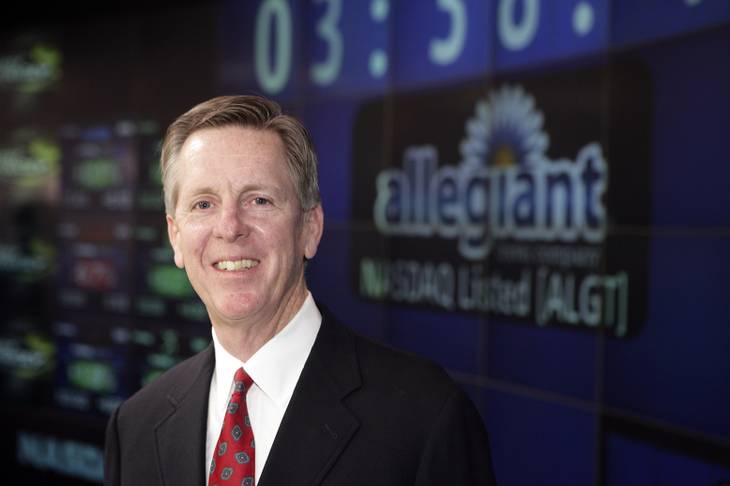Allegiant Air boss Maurice “Maury” Gallagher has made millions selling cheap airfare to small-town vacationers. But that’s not his only source of income.
He’s made investments in real estate, TV production, auto racing, online classes, even a roadside Las Vegas wedding chapel, the kind where Elvis might lead ceremonies.
Some of his companies have also inked multimillion-dollar contracts with Allegiant, thanks to approvals from board members with close ties to Gallagher — and corporate-governance activists are crying foul.
CtW Investment Group is asking Allegiant shareholders to vote out half the six-member board of directors at the ultra-low-cost carrier’s annual shareholders meeting Thursday. CtW, which works with union-sponsored pension funds, cited the three directors’ “collective failure to guard against” the “poor use” of company money.
The move comes after Las Vegas-based Allegiant signed a rising number of lucrative deals — including one for an in-flight TV game show — with companies controlled or partially owned by Gallagher.
Despite the uptick, such deals are declining nationally as activist investors crank up pressure amid widening concerns of self-dealing and as shareholders increasingly throw their weight around with companies, observers say.
No one is accusing the airline or Gallagher — the chairman, CEO and largest shareholder of parent Allegiant Travel Co. — of doing anything illegal. Allegiant discloses deals with Gallagher’s outside ventures each year in filings with the Securities and Exchange Commission, as regulators require for publicly traded companies.
But as Columbia Law School professor John Coffee, director of the school’s Center on Corporate Governance, said, such deals in general are under “a cloud,” particularly with shareholders, and are “becoming uncommon.”
“People are worried earnings will be siphoned off for unfair, self-dealing transactions,” he said.
Deals under scrutiny at Allegiant comprise up to $9.3 million in funds, equivalent to nearly a third of the airline’s “selling, general and administrative” expenses last year, CtW says.
For a company that strives for rock-bottom spending, “these are huge sums,” said Michael Pryce-Jones, director of corporate governance at Washington, D.C.-based CtW.
Some of its transactions are of a "very questionable nature," including the in-flight TV show, which "is just beyond me" why the airline launched it, Pryce-Jones said.
Companies by nature try to negotiate the best terms — spending the least amount of money for the most products or services, for instance.
But in so-called related-party transactions, in which a company does a deal with an owner's or top executive's outside business, there’s “no guarantee they’re both negotiating as well as they can,” said Jon Lukomnik, executive director of the Investor Responsibility Research Center Institute in New York.
He’s also noticed a decline in such deals nationally. But they still occur, and it’s a “red flag” when a company does one outside its normal line of business, he said.
There are two levels of scrutiny for these deals, he said: Is it something the company should even be involved in? And is management getting the right price?
If it doesn’t seem crucial, “why invite the scrutiny?” Lukomnik said.
Gallagher was unavailable to comment, Allegiant spokeswoman Kim Schaefer said Tuesday.
The three targeted board members sit on Allegiant’s audit committee, which approves any big-money contracts with Gallagher’s outside ventures.
The deals in question include a $2.5 million sponsorship of GMS Racing, a company controlled by Gallagher and whose racers include his 25-year-old son, Spencer. That’s up from $125,000 that Allegiant spent in 2012 to sponsor the CEO’s racing team.
Allegiant, through a subsidiary, also paid Alpine Labs about $2.8 million last year to produce “The Game Plane,” a TV game show filmed on Allegiant flights. Gallagher owns a 25 percent stake in Alpine and is on its managing board.
Additionally, the airline spent roughly $828,000 in 2014 — and has approval to spend up to $3.3 million more — for corporate-training programs from Adapt Courseware. Gallagher owns a controlling stake in the firm.
In an SEC filing, Allegiant said its board decided the “publicity value” of the GMS deal “more than exceeded the cost of the sponsorship.” Terms of the Alpine and Adapt deals, as viewed by the audit committee, were “no less favorable to us” than what the airline could have obtained from “unaffiliated third parties.”
Allegiant flies leisure travelers from small, underserved cities to Las Vegas and other warm-weather vacation spots. Gallagher doesn’t receive a base salary at the airline but owns 21 percent of its stock. His holdings were worth $611 million as of Tuesday.
He has several side businesses, including, of all things, weddings. Gallagher bought Chapel of the Flowers, a wedding venue on Las Vegas Boulevard less than a mile north of the Strip, for $3.5 million last August, property records show.
He owns the building and, apparently, the business, according to government records. Those records indicate he teamed with Donne Kerestic, CEO of wedding-planning company Ever After, on the venture.
Gallagher received a $25 million windfall last September by selling shares back to Allegiant. At the time, the company said he would use the fortune “for other ventures he is pursuing personally,” though it did not elaborate.
In recent years, Allegiant typically disclosed just one or two deals with Gallagher’s outside companies. They involved rent payments for Allegiant’s corporate headquarters and other office space, and race-team sponsorships.
Institutional Shareholder Services, a corporate-governance advisory firm, says the current number of deals with Gallagher’s side ventures is “concerning.”
“Such payments blur the lines between personal and corporate investment,” ISS said in a recent report.
Allegiant’s four-person audit committee is tasked with giving independent oversight of airline finances. Among other things, the panel oversees outside auditors, monitors financial reporting and approves transactions worth at least $120,000 with companies owned or partially owned by major Allegiant shareholders, board members or top executives, or their immediate families.
Allegiant’s board has determined that none of the audit-committee members “has a relationship with our company that may interfere” with the panel’s independence from the airline and management, the company has said.
CtW, however, says the committee has three “longtime business associates” of Gallagher, and “the traditional safeguards are absent.”
The panel’s chairwoman is former Allegiant chief financial officer Linda Marvin, a board member since 2013. According to CtW, she has worked with Gallagher for more than two decades. She left the CFO’s post at Allegiant in 2007, so she is deemed independent under securities rules.
Committee member John Redmond, who was on Allegiant’s board from 2007 to 2013 and returned last year, owns real estate with Gallagher. Their holdings include Allegiant’s former headquarters on Durango Drive in southwest Las Vegas.
The third targeted board member, Gary Ellmer, an Allegiant director since 2008, worked with Gallagher at WestAir Commuter Airlines, according to CtW. Gallagher was a principal owner and executive at the former carrier in the 1980s and early ’90s.
Efforts to reach the three directors for comment Tuesday were unsuccessful.
IRRC’s Lukomnik chuckled when told that a former Allegiant CFO sits on the audit committee. This arrangement, he said, is “not usual,” given Marvin’s ties to the airline.
“I would have to be very convinced that that somehow passes the smell test,” Lukomnik said.
ISS, for one, has recommended that investors re-elect every board member except Marvin. Certain audit-committee members, it says, “have relationships that call into question their objectivity.”
Meanwhile, CtW isn’t the only group pushing back against Allegiant at the shareholders meeting.
The Teamsters union is taking aim at the airline’s $8.5 million payout to former president and chief operating officer Andrew Levy after his resignation last fall. It proposed a plan that Allegiant no longer accelerate stock payments under certain circumstances for senior executives who have quit or been fired.
The union has said it does “not question that some form of severance payment may be appropriate” when a top executive leaves. But it’s concerned that Allegiant “may permit windfall awards that have nothing to do with an executive’s performance.”
Allegiant’s board has recommended shareholders reject the plan.
The Teamsters represent Allegiant pilots, and the proposal came as the union and the airline tangled in court over a possible strike.
The union on April 1 called for Allegiant’s more than 500 pilots to walk off the job the next day. But they kept flying, because a few hours after the Teamsters announced the strike, a federal judge issued a temporary restraining order against the union, halting the walkout.
U.S. District Judge Andrew Gordon on May 1 put another spike in the plans, granting Allegiant a preliminary injunction. He ruled that “it would be unlawful for the pilots to strike at this point.”
The union appealed his decision.
Allegiant’s stock dropped sharply after the aviators threatened to go on strike and hasn’t recovered. Union activism may prompt Allegiant investors to support the proposals at the stockholders meeting, but it’s not from pro-labor sympathies.
Big investment firms don’t “care what unions want,” Columbia’s Coffee said. “They want what’s best for shareholders.”

